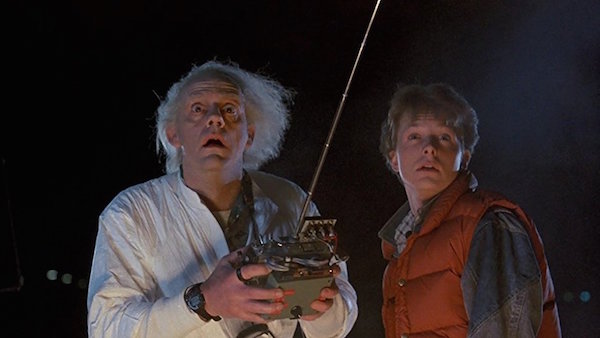Classic Time Travel Paradoxes (And How To Avoid Them)
[Movie still from Time Machine, Warner Bros. and Dreamworks]
Editor’s Note: We’re bringing back one of our most loved posts because hey, time travel is always a relevant topic of discussion. Originally published 11/30/12.
Author’s Note: I assume that some day, this article will serve as an invaluable guide and warning for our time traveling ancestors-to-be (who will of course be unable to read books and learn these lessons for themselves, either because [a] all the books will have been burned, or [b] kids will have stopped reading books entirely, because grumble grumble, god damn kids, when I was your age, video games, blah blah, detriment to society, buncha hooligans, kids these days, no respect, etc). In the meantime, just enjoy it for all of its delightfully entertaining/convoluted/paradoxical pleasures.
As anyone who’s anyone who’s read any time travel story ever could easily tell you, time travel is a tricky subject. Temporal paradoxes might seem simple and straightforward at the start (no they don’t), but they always devolve quite quickly (linear time-wise) into some sort of trippy, philosophically complicated, timey-wimey conundrum that makes even the most convoluted middle school relationship make sense by comparison. Come to think of it, maybe the reason that all those cool kids in middle school suffer from impossibly complicated and melodramatic romances to begin with is because they’re all too “cool” to read time travel stories in the first place, which would obviously teach them the benefits of temporally linear dating, if nothing else.
I’m looking at you, River Song.
For the most part, any paradox related to time travel can generally be resolved or avoided by the Novikov self-consistency principle, which essentially asserts that for any scenario in which a paradox might arise, the probability of that event actually occurring is zero — or, to quote from LOST, “whatever happened, happened,” meaning that no matter what anyone does, they can’t actually create a paradox, because the laws of quantum physics will self-correct to avoid such a situation. Still, I’m wary of such a loose explanation for things, and so below, I’ve compiled a list of a few of the more popular time travel paradoxes — and what to do to avoid them.
ONTOLOGICAL PARADOX: Also known as the “Bootstraps Paradox,” an ontological paradox arises when a person or object is sent through time and recovered by another person, whose actions then lead to the original person or object back to the time from when it came in the first place, thus creating an endless loop with no discernible point of origin. Thus, the original person or object is essentially “pulling itself up by its own bootstraps,” hence the nickname (thanks in no small part to the Robert Heinlein story “By His Bootstraps”).
Example: The Terminator films are a prime and popular example of the Ontological Paradox. In the future, a Terminator is sent back in time to kill the mother of resistance leader John Connor before he is born. While the original T-800 is ultimately destroyed, the leftover pieces are found by scientists who use the technological to…develop and create Skynet, and the Terminator-series robots. Skynet would have never been created if Skynet hadn’t taken over the world and then sent a Terminator back in time to get destroyed and ultimately lead to the creation of Skynet. Trippy, right?
There’s also the fact that Future John Connor sends his buddy Kyle Reese back in time to protect his mother from the T-800, only Kyle ends up totally bangin’ John’s mom (dude high five! I mean, not cool, man) and impregnates her with his buddy John Connor. So to top it all off, if John hadn’t sent his friend back in time, his friend would never have had sex with John’s mom, and John would never have been born (meaning that Kyle Reese is either the best or worst friend, ever).
How to Avoid: No one’s really sure if a real-life ontological paradox would lead to some massive hemorrhaging of spacetime, or if the closed loop is kind of automatically self-corrected since it all works itself out evenly in the end anyway. Still, better to avoid these kind of complicated situations, and the best way to do that would simply be to stop taking candy from strangers — “candy” in this case being mysterious or alien artifacts with questionable origins, possibly given to you by mysterious people who may or may not come from the future. See? Maybe all those warnings that your Mom gave you when you were a little kid still mean something today. Or maybe all along she was just trying to prevent you from sending your friends back in time to sleep with her. Or perhaps encourage it…
—
PREDESTINATION PARADOX: The predestination paradox is similar to the ontological paradox in that the Cause leads to an Effect which then leads back to the initial Cause. The basic tenant of the predestination paradox is similar to that of a self-fulfilling prophecy: the motivation for the time traveler to travel in time is ultimately realized to have been the time traveler’s fault, due to his or her decision to time travel in the first place, or else otherwise unavoidable. Stories involving predestination paradoxes often involve a heavy sense of irony — the time traveler might go back in time in order to change something, for example, but his or her actions inadvertently lead to the exact situation that inspired the time traveler to have gone back and changed things. Thus, nothing ultimately changes. Determinism is a bleak friend.
Example: In Twelve Monkeys, James Cole is sent back in time to prevent a mysterious disaster involving the “Army of the Twelve Monkeys.” His wild rantings in the past about the terrible future from which he came are overheard by Jeffrey Goines, a mental patient who is remembered in the future as the leader of Army of the Twelve Monkeys. Ultimately, Cole’s efforts to prevent his future from happening inspire the actions that lead to his future coming to be. And in a cruel twist of irony, James Cole’s childhood memory of a man in a airport being shot and falling into the arms of a beautiful blonde — the memory that haunts him for the rest of his life — turns out that the guy who was shot was actually him, in the future, dooming young James Cole to grow up and repeat the cycle all over again.
How to Avoid: This one’s tricky, because philosophically, it’s all about free will (or lack thereof). So in fact, by trying to teach you to how to avoid falling victim to the tenants of the predestination paradox, I’m probably going to inspire you to go back in time and create the French film La jetée, which in turn inspires Terry Gilliam to make Twelve Monkeys, which in turn inspires me to use it as an example in this article, et cetera et cetera. Basically we’re all screwed, unless we avoid time travel and time travelers all together. Even a many worlds theory/alternate timeline thing can’t prevent this, because your actions wouldn’t even create a divergent timeline — they would just result in your present situation. So, sorry dude, nothing you can do is going to change anything. Again, unless you don’t do anything at all, although that still doesn’t guarantee anything.
—
GRANDFATHER PARADOX: This one perfectly demonstrates the aforementioned Novikov self-consistency principle. The basic idea is that, no matter how hard you try, you can’t go back in time and kill your grandfather, because if you did, your mother or father would never have been born, which means that you would never have been born, which means you couldn’t have gone back in time and killed your grandfather, which means that you didn’t go back in time and kill your grandfather, because you can’t go back in time and kill your grandfather, because if you did, you wouldn’t be born, which you obviously have already been born because if you were never born then you couldn’t have gone back in time and tried (and failed) to kill your grandfather in the first place.
That’s just a simple and straightforward summary though. You know, in Layman’s terms.
Basically, the Grandfather paradox conveys the idea of a self-correcting universe and/or fixed points in time. Even if you were able to go back in time and, I don’t know, shoot your Grandpa in the head before he ever meets your Grandma (jeez, you must really hate that guy, huh?), your Grandfather would turn out to be an early sperm donor or something, who would still manage even posthumously to impregnate your Grandmother, because you would have to exist in order to have shot him in the head in the first place. So you might be able to fudge a few temporal details here and there, but no matter what you do, the end result stays the same.
Example: Let’s just say that when you’re LOST on a magical tropical island somewhere in the Pacific Ocean (ish?) and you end up skipping through time and decide to try to kill that evil guy while he’s still a kid and/or stop a nuclear bomb you’ve so affectionately nicknamed “The Jughead” from exploding and causing all kinds of electromagnetic problems and inconsistencies on your already-mystical island home, the best that’s going to happen is you get some kind of weird Hindu sideways limbo reality that works as a parallel narrative to the entire last season of your television show. Oh, and that little kid you shot still turns out to be pretty evil, and it’s all your fault.
How to Avoid: Uhh, don’t try to kill your grandfather in the past before the birth of your father? Take that as a metaphor all you’d like.
—
HITLER’S MURDER PARADOX: This is similar to the Grandfather Paradox, in that the time traveller goes back in time to change something significant that has already happened. Unlike the Grandfather Paradox (which we assume would self-correct despite our best efforts), the change that one wishes to affect in the Hitler’s Murder Paradox is one that is more technically feasible — as in not intrinsically paradoxical — but still ultimately problematic.
The name comes from the idea that one could theoretically go back in time and kill Adolf Hitler before the Holocaust happened, thus preventing the systematic annihilation of some six million Jews and other minorities. Which, ya know, all sounds good and well, except that it tends to lead to some kind of downward spiraling domino effect with plenty of other consequences that the well-intentioned time traveler probably didn’t consider, and which ultimately might lead to a worse situation than that which the time traveler had hoped to prevent.
Example: This kind of stuff is rampant in comic books, especially X-Men, but the best example of it was the early 90s Age of Apocalypse storyline, in which Professor Xavier’s schizophrenic mutant son, Legion, decides to make daddy proud by helping his dream of mutant-human co-existence come true. Legion concludes that the best way to do this is to go back in time and kill Magneto before he becomes, ya know, Magneto. The only problem is, Magneto and Xavier were like totally BFF back then, so Xavier ends up taking the bullet for Magneto and dies (so yes, Legion does technically end up killing his own father, but that’s not the point).
As a result of there being no Charles Xavier, the psycho evil Darwinist uber-mutant Apocalypse ends up taking over the world before Magneto’s team of X-Men (named in honor of his deceased friend) are able to stop him, which leads to all kinds of crazy situations like evil Hank McCoy aka Dark Beast, who works alongside the evil versions of Cyclops and Havok, or a Sabretooth who is actually a pretty likeable superhero and a member of the X-Men. Oh, also, Magneto and Rogue totally have the sex, and humans are being systematically slaughtered in concentration camps by Apocalypse and his cronies. So basically, in his attempt to kill a perceived “Hitler” in the form of Magneto, Legion caused a real and even more twisted Holocaust to happen. WHOOPS.
How to Avoid: In addition to the whole alternate-reality-that-is-ironically-worse-than-the-world-as-it-used-to-be problem, there’s also the moral compromise of killing an innocent child, even though you know that child is going to grow up to become pretty much the worst (greatest?) mass murderer in history. The best way to avoid it is simply and sadly to accept that you cannot change the past and shouldn’t even try. That is, unless you’re smart enough to have eliminated any possibility of negative domino effect resulting out of your actions.
For example, if you went back in time and eliminated M. Night Shyamalan shortly before the release of Signs, there would be nothing but positive results; the world would mourn the tragic and mysterious loss of a gifted young filmmaker taken before his time, we would all be so blinded by the shock of his death that we’d be able to ignore how bad the aliens looked in that movie (and the fact that seeing them at all was completely unnecessary), and the rest of us wouldn’t have been forced to endure such awful schlock as The Happening or Lady in the Water. See? That way everyone wins!
—
BUTTERFLY EFFECT: Similar to the cascading domino effect of the Hitler’s Murder Paradox, but on a different level. Whereas killing Hitler would obviously be a landmark event with quite a significant historical impact, something like, say, accidentally stepping on a bug in the past probably wouldn’t have as big of an effect, right?
Have you even been paying attention? Of course it will! That’s the whole point of a time travel paradox! Just like the way that a butterfly flapping its wings in Brazil can affect a weather system in Texas, one tiny change in the past can lead to all kinds of Rube Goldbergian complications that can subtly — or seriously — affect the present. The term “Butterfly Effect” is actually derived from “A Sound of Thunder,” a short story by Ray Bradbury, in which a character accidentally steps on a butterfly in prehistoric times and causes catastrophic changes in the future from which he came.
Example: In Orpheus With Clay Feet by Philip K. Dick, the main character, Jesse Slade, enlists in the services of a time travel tourism agency, who set him up with a trip that allows him to go back in time and act as a muse for some significant historical figure. Slade chooses to go back and inspire his favorite science fiction writer Jack Dowland (which was also Dick’s pen name). Unfortunately, in his efforts to inspire Dowland’s monumental science fiction work, Slade directly reveals to Dowland that he is a time traveler hoping to inspire his work. Dowland takes this as an insulting ruse, and as a result, never becomes the great science fiction writer that he is meant to be. He does, however, publish a single science short story, under the pen name Philip K. Dick: a story called Orpheus With Clay Feet, about a time traveler that goes back in time to inspire his favorite science fiction writer, a man named Jack Dowland.
How to Avoid: Watch your step




